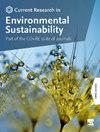气候变化对印度粮食安全和营养的影响:系统综述
IF 3.8
Q2 ENVIRONMENTAL SCIENCES
Current Research in Environmental Sustainability
Pub Date : 2025-01-01
DOI:10.1016/j.crsust.2025.100286
引用次数: 0
摘要
气候变化对粮食和营养安全构成复杂挑战,影响人类健康、福祉和可持续发展。印度面临着农业脆弱性加剧和人口增长超过13亿的问题,需要对这些影响进行详细研究。这种审查将成为制定政策、指导研究工作和促进公共话语的重要资源。本系统综述全面分析了气候变化对印度粮食和营养安全的影响。该研究考察了231篇文章,深入探讨了各种维度,包括可用性、可访问性、利用率和稳定性。该综述利用了Web of Science、PubMed和CABI综述,使用了100个不同的关键词。温度变化、不稳定的降雨和极端天气事件扰乱了作物、牲畜、家禽和水产养殖生产(粮食供应),导致粮食短缺、收入损失和粮食价格上涨(可获得性),尤其影响到低收入群体。间接地,气候变化影响生计和收入,加剧不平等,导致边缘化社区流离失所(稳定),从而加剧粮食不安全和营养不良(利用)。然而,很少有研究涵盖了气候变化对传统作物、营养价值、农业生物多样性、粮食分配系统、土著粮食系统和营养结果的影响等各个方面,特别是对妇女和儿童等弱势群体的影响。因此,迫切需要一种更全面和综合的方法来解决气候变化对印度粮食和营养安全的影响。本文章由计算机程序翻译,如有差异,请以英文原文为准。

Effects of climate change on food security and nutrition in India: A systematic review
Climate change poses a complex challenge to food and nutritional security, impacting human health, well-being, and sustainable development. India, facing heightened vulnerability in agriculture and a growing population surpassing 1.3 billion, requires a detailed examination of these effects. This examination will serve as a crucial resource for shaping policies, directing research efforts, and fostering public discourse. This systematic review thoroughly analyzes the impact of climate change on food and nutritional security in India. Examining 231 articles, the study delves into various dimensions, including availability, accessibility, utilization, and stability. The review utilized Web of Science, PubMed, and CABI review, employing 100 different keywords. Temperature variations, erratic rainfall, and extreme weather events disrupt crops, livestock, poultry, and aquaculture production (food availability), leading to food shortages, income loss, and elevated food prices (accessibility), especially affecting low-income groups. Indirectly, climate change affects livelihoods and incomes, exacerbating inequalities and leading to the displacement of marginalized communities (stability), thereby escalating food insecurity and malnutrition (utilization). However, few studies cover diverse aspects such as the influence of climate change on traditional crops, nutritional value, agricultural biodiversity, food distribution systems, indigenous food systems, and nutrition outcomes, particularly for vulnerable groups like women and children. Hence, there is a pressing need for a more holistic and integrated approach to tackle the impacts of climate change on food and nutrition security in India.
求助全文
通过发布文献求助,成功后即可免费获取论文全文。
去求助
来源期刊

Current Research in Environmental Sustainability
Environmental Science-General Environmental Science
CiteScore
7.50
自引率
9.10%
发文量
76
审稿时长
95 days
 求助内容:
求助内容: 应助结果提醒方式:
应助结果提醒方式:


